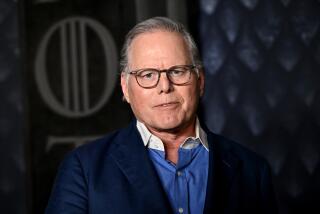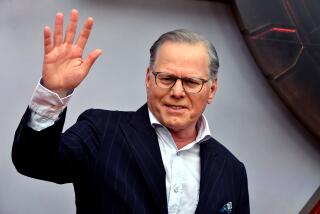Time Warner -- Turner Talks : NEWS ANALYSIS : STUDIOS : Out of the Spotlight, Another Synergy Looms
In the rapidly changing landscape of Hollywood, where the mantra of the day is bigger is better, it would seem that the importance and role of the good old-fashioned movie studio somehow gets lost--maybe even diminished--in the towering world of media mega-mergers.
“All of a sudden our jobs seem unimportant,” said one studio head after hearing the news that yet another “world’s largest” media giant was in the making with Time Warner Inc.’s proposed $8-billion buyout of Turner Broadcasting System Inc.
“No one has any interest in what happens in the movies, it’s just about who’s buying what,” said the executive.
While that kind of response is not surprising given the seemingly dwarfed nature of the once-all-powerful movie studios, it seems to be an innocent overreaction and perhaps too narrow a view.
Robert Daly, co-chairman of Warner Bros., who along with Terry Semel oversees the studio’s successful movie and TV operation, says that in the new scheme of things, product “becomes the lifeblood, the heart” of these multimedia conglomerates.
*
“Having successful movies gives you muscle in the marketplace,” said Daly, pointing out their particular importance internationally, where revenue streams are multiplying at a faster rate than in the United States. “It’s very, very important and will always be important.”
Semel, who said he’s bullish about the prospects of a Time Warner-Turner merger because “it’s a terrific combination of assets,” noted that “the programming opportunities on a worldwide basis are enormous.”
For example, the combination of Warner Bros.’ new library with the pre-1952 Warner library that Turner owns, could boost Time Warner’s TV sales around the globe. Not to mention the obvious synergies between Turner’s cable channels and Warner’s movies, Turner’s cartoon channel and Warner’s animated product, and Time Warner’s theme parks and merchandise stores and Turner’s various characters from the MGM, Warner and Hanna-Barbera libraries.
Since the mid-’80s, it has always been media mogul Ted Turner’s dream to build a movie empire. In 1986, through his brief ownership of MGM/UA, he retained the MGM library, which not only included such classics as “Gone With the Wind,” “Ben Hur” and “Dr. Zhivago,” but also the Warner Bros. library with such pre-1950 classic movies as “Casablanca” and pre-1948 cartoon characters such as Bugs Bunny, Tweety and Daffy Duck. In 1988, he bought the RKO library, which includes such classics as “Citizen Kane,” the Katharine Hepburn movies “Stage Door” and “Morning Glory” and nine Fred Astaire-Ginger Roger musicals.
But it was two years ago that Turner really got serious about being a movie mogul. He doled out $650 million for New Line Cinema, including its Fine Line subsidiary, and Castle Rock Entertainment. A year ago, he hired former Columbia Pictures senior production executive Amy Pascal to beef up his own fledgling movie company Turner Pictures.
The expectation was that the combined movie output from the three labels would be 50 films a year by 1998. By then, he told the trade paper Variety, he anticipated spending $1 billion a year on combined negative production costs, which would make his company competitive with the other majors.
His intention was to create the biggest film studio in Hollywood, enhancing his 3,300 title library and feeding his company’s various cable outlets, which include TNT, TBS and Turner Classic Movies. If Time Warner bought his company, Turner would finally have a major movie studio. But it wouldn’t bear his name.
One of the big question marks is how Turner’s three movie companies will fit in with Warner Bros., which is a formidable production entity that releases more than 30 major films a year.
Alan Horn, chairman and one of the five partners of Castle Rock, said he views the potential acquisition as “only good for us.” From Castle Rock’s standpoint, he added, “there will be more opportunity. . . . The bigger the parent company and the more power one has to go out and compete the better.”
Castle Rock, Warner sources agree, would be a perfect fit. The company produced such hits as “A Few Good Men,” “In the Line of Fire” and “When Harry Met Sally.” Although it suffered a losing box office streak since the acquisition, it still primarily makes the same kind of big, star-driven studio fare that Warners does. Since Castle Rock’s current distribution deal with Columbia Pictures expires at the end of 1997, Warners could handle the release of its future movies worldwide.
*
“It’s an easy fit for us,” said a Warner executive, adding, “New Line is a little more complicated.”
New Line--which prides itself on its operational independence to market and distribute its own movies--could prove more problematic, especially if its principals feel that the autonomy guaranteed them when they sold to Turner is jeopardized in any way.
New Line’s top executives declined to comment Wednesday.
Like Castle Rock, New Line--for years known only for its niche and genre films such as the “Nightmare on Elm Street” series--also now plays in the big leagues with such breakout commercial hits as “Dumb and Dumber,” “The Mask” and the nation’s current No. 1 hit, “Mortal Kombat.” New Line releases between 15 and 20 movies annually, with plans to distribute six to eight additional films from Turner Pictures within the next three years, and Castle Rock another half a dozen (with plans for eight to 10 a year by 1998).
One producer associated with Warner speculated that the studio “would spin off one of these entities, most likely New Line, because it’s duplication.”
But others say Time Warner could comfortably accommodate different creative viewpoints.
“Look at Time Warner and how they’ve dealt with their free-standing entities in the music business. They have significantly competitive music labels and it works,” said a source at New Line, adding: “Yes, we would be competing with Warner Bros. and Castle Rock, which we already do, but that’s not the issue really. Look at how many different toothpastes Procter & Gamble have.”
The future of Turner Pictures in a Time Warner-Turner combination is even more uncertain. Sources speculate that because the company has not yet kicked into high gear (its first and only release this year is the Dawn Steel-produced “Angus”)--it could be folded into Warner or shuttered altogether.
Warner Bros. also would “have to do something to satisfy and keep the other independents happy, otherwise they’ll be looking for new homes,” said one source. Among the production entities operating on its lot are Morgan Creek Productions and New Regency, their two biggest outside movie suppliers.
A source close to producer-financier Arnon Milchan said he has been restless for some time and may leave. Milchan was out of the country and unreachable.
(BEGIN TEXT OF INFOBOX / INFOGRAPHIC)
The Holdings
With its offer of $8.5 billion in stock for Turner Broadcasting System Inc., Time Warner Inc. is looking to add Turner’s diverse portfolio of networks and motion picture studios to its lucrative stable of entertainment businesses. A look at the companies’ holdings:
TIME WARNER INC.
* Publishing: Time Inc. publishes a group of 24 magazines, including People, Sports Illustrated, Fortune and Time. This segment also includes book publishers Warner Books and Little, Brown & Co., which published the best-selling “The Celestine Prophecy.”
* Music: Warner Music Group operates in more than 65 countries and is the most profitable unit in the Time Warner family. Warner Bros. Records, Atlantic Group, Warner Music International and Elektra Entertainment Group boast superstars such as R.E.M, Madonna.
* Filmed entertainment: The Warner Bros. studio has produced such hit movies as “Batman Forever” and “Lethal Weapon” and the Emmy-nominated television shows “ER” and “Friends.”
* Time Warner Cable: This division entered the telecommunications business in 1994 and launched the Full Service Network, which provides video on demand, video games and interactive home shopping.
* Programming: Includes Home Box Office, the world’s largest pay TV service, and Cinemax.
Earnings, in millions of dollars:
1994: -$91.0
TURNER BROADCASTING SYSTEM INC.
* Cable: Operates four 24-hour cable services in the United States: the TBS SuperStation, which airs “Live From the House of Blues”; Turner Network TV; the Cartoon Network, and Turner Classic Movies.
* Broadcasting: Turner Broadcasting’s motion picture production and distribution arm includes New Line Cinema, which released “The Mask,” and Castle Rock Entertainment, known for the critically acclaimed “The Shawshank Redemption” and the hit TV series “Seinfeld.” The production unit operates Turner Pictures Worldwide and Hanna-Barbera Cartoons.
* Film libraries: The company manages an animation library and owns and operates a feature film library of more than 3,000 titles.
* Publishing: Operates Bedrock Press.
* News: Holds three 24-hour news networks, including CNN and CNN International, which reached 84 million homes in 145 countries in 1994.
* Other: Owns the Atlanta Braves baseball team, the Atlanta Hawks basketball team, World Championship wrestling, the CNN Airport Network and the CNN Center, which houses the company’s corporate and news headquarters.
Earnings, in millions of dollars:
1994: $21.2 Sources: Bloomberg Business News, Times reports. Researched by JENNIFER OLDHAM / Los Angeles Times
More to Read
The biggest entertainment stories
Get our big stories about Hollywood, film, television, music, arts, culture and more right in your inbox as soon as they publish.
You may occasionally receive promotional content from the Los Angeles Times.










